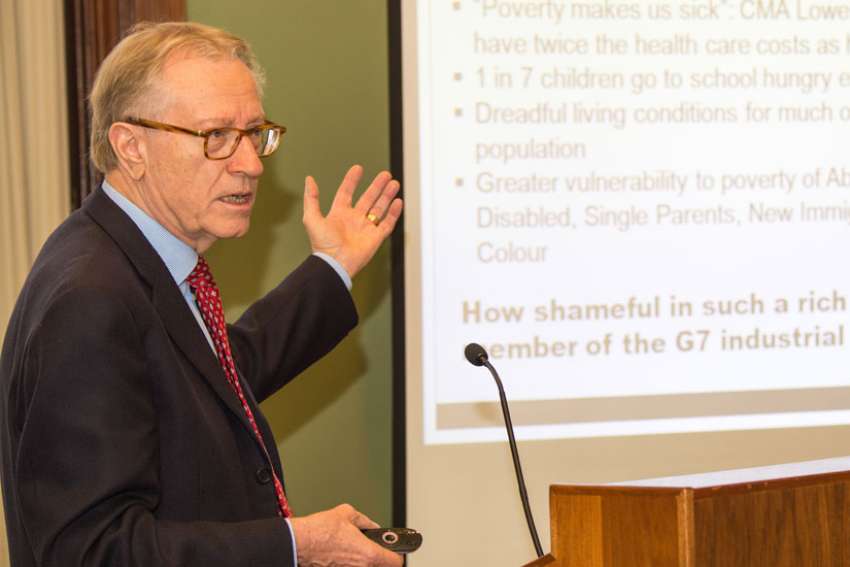The answer is pretty clear for Senator and former Toronto mayor Art Eggleton.
“The system has failed,” he told religious leaders gathered at Queen’s Park Nov. 24.
“The band-aid approach, the incremental approaches that have been tried over the years – as good as the intentions have been – still haven’t been enough to really move the (poverty) numbers in a big way.”
Little tweaks here and there to welfare systems aren’t going to change the outlook for a million Canadian households who can’t pay the rent and put food on the table, Eggleton told members of the Interfaith Social Assistance Reform Coalition (ISARAC). Too many Canadians have been left behind by a rapidly transforming and globalizing economy, he said.
“You know this came up a lot in the U.S. election,” Eggleton said. “The fact is that a lot of people have been left out.”
Speaking to ISARC in the Ontario legislature on the same day as Campaign 2000 released its annual report card on child poverty, Eggleton proposed five ways in which Canada could tackle its growing problem with entrenched poverty – a problem that costs the Canadian economy $30 billion per year.
- - A guaranteed annual income or basic income could simplify the administration of complicated welfare systems and ensure the working poor don’t lose out.
- - A living income of about 1.5-times the current minimum wage would lift people out of poverty.
- - A complete review and reform of the tax system, not attempted since the 1970 Carter Commission, could lessen could close loopholes and lessen inequality.
- - A national housing plan could mean the poor don’t live with the threat of homelessness.
National dental and pharmacare would protect families facing sudden costs.
“Then there’s the question of political will,” said Eggleton. “Poverty is a tough sell come election time.”
“Policy makes a difference,” MPP Cheri Di Novo said in response to Eggleton’s half-hour presentation.
Di Novo supports a guaranteed income but points out that the idea has been kicked around since the mid-1960s and politically seems no closer.
“While we’re waiting for guaranteed income, here’s some things we can do tomorrow,” she said.
Di Novo told the religious leaders they should be asking politicians for a living wage and labour reforms to make it easier for people to join a union, tougher rent control, affordable childcare “like they have in Quebec,” pharmacare and dental care.
Down the hall from the ISARC meeting, Campaign 2000 was revealing a report card on Ontario child poverty that includes an 18.8 per cent child poverty rate for 2014, the most recent statistics available. One in five children under six, or 174,250 kids, live in poverty.
The depth of poverty in Ontario continues to be an issue, according to the Campaign 2000 report. A couple on Ontario Works with two children live on $15,709 less than the Statistics Canada “Low Income Measure” which draws the poverty line at $35,648 for a family of four.
Income inequality in Ontario means that, on average, the top 10 per cent of Ontario families take in $262,000 per year more than the average family in the bottom 10 per cent. It would take 11 years of work for a bottom 10 per cent family to make up the difference in one year of income, according to the Campaign 2000 report card.
One out of every seven Ontario families with children live in poverty, says Campaign 2000.
“How shameful, I say – especially in such a rich country, a member of the G7," said Eggleton.


